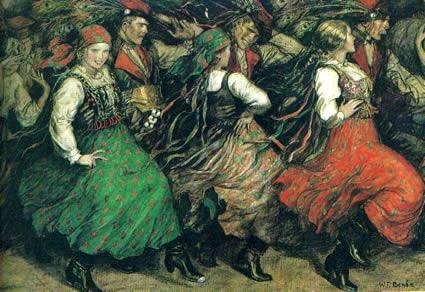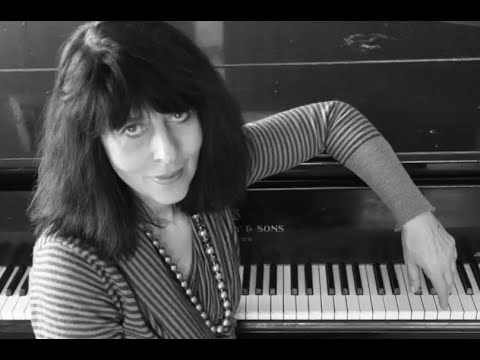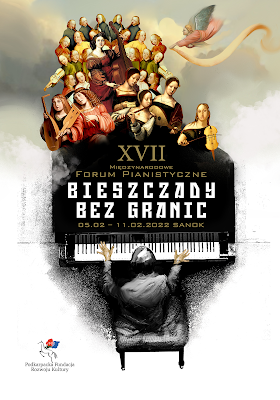A Russian pianistic and musical 'Dynasty' appears magically in Warsaw - 13th February 2022
The word 'dynasty' is defined by the Cambridge English Dictionary as 'a series of rulers or leaders who are all from the same family'. The concert this evening, 'Lions of the Piano', was absolutely unique in depicting a 'dynasty' of the Russian School of pianism. Perhaps this was not a family in any biological sense but certainly from the same 'family' of performers and interpreters.
The pater familias was the great Russian pianist Lev Oborin (1907-1974) who won the First Prize in the 1st International Fryderyk Chopin Competition in January 1927 (and in addition a valuable and rare silk rug from the Galician town of Buczacz - Buchach - those were the days!).
My knowledge of this pianist comes mainly from the incomparable recordings of the Oistrakh Trio, a musical collaboration between Lev Oborin, David Oistrakh and Sviatoslav Knushevitzky that lasted from 1941 until 1963. Their recording of the Chopin Trio Op.8 is arguably the greatest recording of this work.
Oborin gave many concerts but always remained on the teaching staff of the Moscow Conservatory. He trained many outstanding pianists such as Vladimir Ashkenazy and one of tonight's performers, Professor Mikhail Voskresensky, who was recently awarded the Polish Gloria Artis medal in Sanok for distinguished contributions to Polish culture. Oborin 'could stand apart from all the intrigues and squabbles at the Conservatory' (Dimitry Paperno). He detached himself from any interference in the cruel ideological campaigns of that depressing time. Incidentally 'Lew' or 'Lev' means 'lion' in Polish, the theme of tonight's concert.
Let us explore the age branches of the Russian 'Lions of the Keyboard' family tree, in descending order of years. At the crown, the distinguished Professor and soloist in the F minor Chopin piano concerto this evening, Professor Mikhail Voskresensky, a renowned pupil of Oborin. Another soloist in a Mozart concerto, Professor Natalia Trull, once an outstanding pupil of the same Mikhail Voskresensky. She is now in turn the teacher of the other two soloists from Moscow. The seventeen year old Eva Gevorgyan who performed the Chopin E-minor piano concerto and the eleven year old child prodigy Elisey Mysin, who played a Bach harpsichord concerto on the piano. Such a unique and remarkable arboreal pianistic apparition has materialized quite magically in Warsaw!
 |
| Elisey Mysin |
The evening began with the youngest member pf the 'family', the young, eleven year old, Elisey Mysin. He performed the Bach Harpsichord Concerto in G minor BWV 1058 which is a transcription of Bach's Violin Concerto in A minor BWV 1041.
He is a talented actor, pianist and composer from Stavropol Russia. He started playing piano at the age of four. He is currently studying at the Central School of Music of Tchaikovsky Moscow State Conservatoire under the honoured artist and pedagogue, Professor Natalia Trull. He already has his own Youtube, Instagram and other social media connections.
I make no apology for quoting my own review of the Sanok recital except on this occasion I felt this performance to be far superior. Mysin must have practiced hard in the intervening days as evidenced by one of his fingers being taped, something I have rarely seen except with Alfred Brendel.
The opening Allegro continued to be full of electrical energy and drive with a full comprehension of baroque performance style. His grasp of polyphony, counterpoint and articulation, especially in his strongly developed LH, continued to be quite remarkable. I wondered once more if a listener closed his eyes would he be tempted to judge the pianist as a child rather than an accomplished mature artist. He played without music and his change of fingers on trills something marvellous to behold. The piano was well supported and balanced by the string National Philharmonic Chamber Orchestra under the excellent conductor Bogdan Olędzki. At one point he beat time between movements, something I have never seen before. Mysin has remarkable co-ordination with the orchestra which indicates an intense natural musical instinct, communication, sense of timing, tempo and phrasing. He cannot by definition have played with orchestra many times!
The Andante on this occasion was far more legato, soulful and sensitively expressive, far more characteristic of Bach's writing for the violin. The Allegro assai movement was again full of carefree energy and delight, yet moderate in tempo and cast by Bach in the form of a gigue. Mysin's staccato articulation was tremendously expressive. The string orchestra once again skillfully exploited the string bariolage figures with interesting sound effects.
His 'professional' behavior is also remarkable and precocious - so cute - shaking hands with the conductor and leader of the chamber orchestra at the beginning and conclusion of the work like any distinguished artist, but in miniature!
 |
| Eva Gevorgyan |
Eva Gevorgyan then came to the stage to perform the Chopin Concerto in E-minor Op.11. This was simply a 'perfect' interpretation of the concerto by this seventeen year old, which left me with absolutely nothing to say. Tone, touch and texture of sound was finished with the seductive burnish of fine Meissen porcelain.
I see no reason to alter my review of her outstanding recent Chopin competition performance of the work, apart from the fact tonight it was even finer than ever, far more musically persuasive than in the competition. I suspect this was owing to many performances of the work since the jury awarded her the inexplicable, almost non-musical, 'Prize for the youngest female finalist in the Competition'. Surely this was an absurdly and relatively insignificant musical award considering her interpretative achievements. After hearing the performance tonight, they might like to seriously reconsider what judging criteria brought them to this decision.
Allegro maestoso
A grand, majestic and aristocratic opening of strength, yet with many sensitive expressive layers and gestures. Glorious tone, refined touch and glistening articulation. This was fluent musical speech engaging directly with the audience. Her phrasing followed Chopin's indications exactly and this exactitude was not simply the phrasing. She extracted such sadness, regret, even anguish, from the heart-wrenching melodies. A true Allegro maestoso opening.
The entire movement appeared as a narrative musical history of the Polish spirit with all its periods of fraught suffering and euphoric joys. Perhaps a slight feeling of being over-prepared on rare occasions and lacking in a light spontaneity. She possesses a unique understanding of musical narrative and fantasy in Chopin. Her style brillante was slightly restrained to less than full wattage which gave a seductive golden tonal glow to the scintillating runs and fiorituras.
Romanze. Larghetto
The entire concerto revolves around this love, this unrequited love of youthful Chopin expressed so intensely in this movement. The tempo was romantic and slow with the most gloriously imaginable poetic phrasing and tone. The fragile dreams that occupy the romantic mind on moonlit nights in the silent countryside, a lone wanderer, straying far as his mind floats from one romantic memory to another, the silhouettes of willows at dusk on the banks of a river in Mazowsza. Everything was in place - colours, shading, poetry, timbre, nuance, phrasing, rubato and following Chopin exactly as he scored the work. The cello provided an ardent counterpoint to the lyrical melody in its own heartfelt yearning. She introduced subtle ornamentation at moments. Chopin emphasized the production of a beautiful tone from his pupils, often above other aspects of playing the piano.
I was transported into another dimension beyond the hall in Wawer, a domain of the now inaccessible world of illusioned love, that enchanted grove one may inhabit briefly before the tigers of experience begin their merciless work. Yes, transported to another world of pure music, heightened reality and all the romantic associations of a love poem. So many exquisite details too numerous to mention presented themselves.
Allegro vivace
This was such a refined, stylish and elegant interpretation of the krakowiak. Gevorgyan effortlessly again produced a remarkable style brillante sound of extraordinary glistening quality with the true jeu perlé of a tumbling mountain stream. Her dynamic range is extensive but never an ugly, strident forte with always captivating, diaphanous pianissimos. She presented us, without banal artifice but with careful forethought, all the transparent, polyphonic internal detail that lies buried in this score. Wonderful detached phrases, fertile silences, instinctive rhythms, exuberance and heartfelt rubato.
I would place her, despite her youth, beyond pianists into the world of artists. The concerto was presented as a complete interrelated structure of three movements, accelerating us through many integrated and coherent emotional landscapes. How brilliantly Chopin in this score winds up to the triumphal conclusion with all the élan and panache of a great concert artist.
Yet again, one of the finest individual accounts of this concerto I have heard. The musical support given by the National Philharmonic Chamber Orchestra under the gifted Bogdan Olędzki underlined the convincing nature of performing the Chopin concerti with orchestral forces reduced to strings.
And the audience gave her an instant standing ovation and many cheers!
 |
| Krakowiak Wladyslaw Teodor Benda (1873-1948) |
I would like to quote some absolutely appropriate lines of poetry to describe my feelings concerning this music and this interpretation. They are taken from the last stanza of Ode on a Grecian Urn written in May 1819 at the age of 23 by the youngest English Romantic poet, John Keats (1795-1821), this work conceived during his tragically brief life on earth.
When old age shall this generation waste,
Thou shalt remain, in midst of other woe
Than ours, a friend to man, to whom thou say'st,
"Beauty is truth, truth beauty,—that is all
Ye know on earth, and all ye need to know."
 |
| Professor Natalia Trull |
In 1781 Mozart happily quit Salzburg for Vienna which gave rise to much joy in his subsequent compositions. The choice of the Piano Concerto in E-flat major K. 449 (1784) is an interesting one. The concerto premiere was highly popular and successful. In February 1784 Mozart began a list of completed works in a notebook, keeping this until a few weeks before his death. The empty pages that followed his departure are a tragic testament to our artistic loss.
The first work listed in the notebook is this piano concerto. It is scored for a small, almost obbligato, orchestra which suited the strings of the National Philharmonia Chamber Orchestra exceptionally well. He dedicated it to his pupil, the eighteen year old (youth again!) Barbara von Ployer - 'Babette' - who would have rather restricted forces at her command in any domestic performance. Mozart referred to this concerto as 'one of a quite peculiar kind'. Alfred Einstein observed that he never wrote another like it, before or after.
A panorama of the ebullient creative and conversational spirit between orchestra and soloist opens out before us in this work. Natalia Trull expressed with musical brilliance the fluctuating dynamics and chromatic writing of the undulating emotional unease that suffuses the opening Allegro vivace. She retained the classical style with persuasive authority and the fine, rather dry sound quality in tone and touch, of the eloquent older Viennese instruments of Anton Walter. The ravishing clarity of her varied articulation was assisted by artful pedalling. The conductor Bogdan Olędzki's extensive experience in Mozart operas at Opera Bałtycka in Gdańsk was clear in the fine orchestral augmentation and conversational interchanges with the soloist.
The Andantino was immensely sensitive and expressive in its simplicity yet avoided sentimentality. In life, after melancholic reflections and regrets, one must continue to move forward with renewed purpose, even if altered in one's attitude to the future. Such feelings were perfected in Figaro.
An exquisite joyfulness that illustrated this erupted in the final Allegro ma non troppo movement, a rondo which has such infectious rhythmic and harmonic exuberance it makes you want to dance. Trull played this exultant movement with all the expressiveness and graceful elegance one could possibly imagine. The approach was replete with Viennese charm and gemütlichkeit. Music emerged as a language with conversational gambits between orchestra and soloist. The co-ordination with the orchestra was remarkable and artistically uplifting. Added wit and innocence was created by her diminutive, brilliant pupil Mysin, turning the pages of the music.
The audience, orchestra and conductor all clearly appreciated the deep musicianship displayed in this interpretation and execution and everyone gave her an immediate standing and enthusiastically applauded ovation.
The final work on the programme was the Chopin F-minor piano concerto played by the 'elder statesman' of the musical 'family' assembled here tonight, Prof. Mikhail Voskresensky.
I feel it would be churlish and boastfully presumptuous to attempt any constructive criticism of this great artist and musician. I felt the performance was far superior to the one he gave at Sanok. It was an approach that took me back to the deeply rewarding, authoritative, non-declamatory, iconic mature Chopin interpretations of past masters of the instrument and of the music written for it.
I would only say it was a magnificent conception, cohesive and fully integrated by profound musical experience. A performance of mature brilliance and organic naturalness. The 'imprisoned Romanticism' of the great Polish musicologist Mieczysław Tomaszewski was in clear evidence. The melodic line was often finely ornamented with seamless fiorituras that overlaid an affecting legato. The cello was again a beautifully ardent and romantic commentary and melodic counterpoint to the soloist in this reduced string chamber version of the concerto.
In a way, this master performance was rather like a great mature Bordeaux wine from say the immortal Chateau Latour, satisfying one on every level of aesthetic and sensual appreciation. Again I had nothing left to say as the great work concluded, apart from reflecting and hoping that I will still possess such an exceptional level of creative and aesthetic energy at his age, even with my comparatively mediocre musical achievements.
What a miraculous evening this was, scarcely to be imagined ever being repeated, but we live in hope!
Do watch this uniquely inspiring concert and come to your own conclusions!








Appreciate your insightful account of the concert, thank-you. Was it video'd and if so is there an internet address please.
ReplyDeleteThe information in the post you posted here is useful because it contains some of the best information available. Thanks for sharing it. Keep up the good work Music Booking Agency Hobart
ReplyDelete